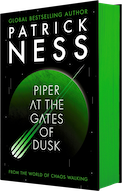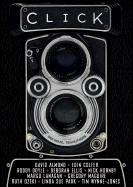Notes: BookCourt Expanding; Bookstore Customers Write Novel
BookCourt,
Brooklyn, N.Y., is building a 1,600-sq.-ft. wing that should be
finished in late November and will nearly double the store's size, the Brooklyn Daily Eagle
reported. BookCourt's
new wing will house a small café and bar
with outdoor garden as well as nonfiction titles, which are currently in the
basement. In the future, the basement will be used for remainders.
Children's book inventory will be tripled.
Owners Henry Zook and Mary Gannett, who founded the store in 1981, attributed the impetus for the long-considered expansion to
their son, Zack, who has been involved in the family business fulltime
since graduating from college in 2005. Zack also plans to start
publishing Cousin Corinne, a literary journal that will include
fiction, essays, poetry and dramatic works and be separate from the
store. Eventually he hopes for BookCourt to publish books.
Several keys to the store's success: owning its own building and its
location, "on the nexus" of Boerum Hill, Cobble Hill, Carroll Gardens
and Brooklyn Heights. "It's a great location," Henry told the paper.
"Though we didn't know that at the time."
---
Crossroads Books, Clarence Center, N.Y., has given new meaning to the phrase "a community of writers" by sponsoring a group effort "to write a coherent novel." According to Buffalo TV station WIVB, "Beginning with just an opening paragraph and a small list of rules, visitors to the bookstore are invited to read what has been written and continue the story with a few sentences or a few paragraphs. New characters and plot lines, which will hopefully carry the story along, can be introduced at any point."
---
The Dothan Eagle
celebrates the 25th anniversary of Dove Christian Supply, which has
stores in Dothan and Enterprise, Ala. During September the store is
having weekly specials and events, ending with a grand prize drawing
for a 25-inch color television, a DVD player and 25 DVDs on September
29.
Founded by Pete and Yvonne McCollough, Dove carries books, DVDs,
posters, cards, clothing, choir robes, church supplies, gifts and art as
well as such Jewish items as prayer shawls and menorahs. "We are very
careful about how we pick our products," Yvonne McCollough told the
paper. "No matter what it has to be Biblical. We put a lot of thought
and prayers into it."
---
John
MacGregor has been promoted to full time event and marketing
coordinator of the Cadence Group, which handles book tours both in person and online. He will handle
all bookstore, school and library author tours and event bookings. He
may be contacted at jmacgregor@thecadencegrp.com.
Anne Frecka is joining Cadence Group as client manager. She was
formerly a copy editor and contractor for the Writer's Digest line at
F+W Publications. She may be reached at manager@thecadencegrp.com.













 Teachers, librarians and booksellers can find inspiration in this successful collaboration, ideal for igniting in young people the desire to do similar interlinking writing projects. In the first chapter of this 10-chapter novel, Linda Sue Park plants the seeds for the story developed by the nine authors who follow. The book opens just after George Keane, a photojournalist (called "Gee" because he signs his photos "G. Keane") who chronicled images of World War II, of Muhammad Ali's rise to champion and who traveled the globe, has died. He leaves to his grandson, Jason, a stack of his photos (some autographed by his subjects), and to his granddaughter, Maggie, a collection of seashells in a handcrafted wooden box with mysterious markings. It is a puzzle "that would last her whole life" and takes her around the world.
Teachers, librarians and booksellers can find inspiration in this successful collaboration, ideal for igniting in young people the desire to do similar interlinking writing projects. In the first chapter of this 10-chapter novel, Linda Sue Park plants the seeds for the story developed by the nine authors who follow. The book opens just after George Keane, a photojournalist (called "Gee" because he signs his photos "G. Keane") who chronicled images of World War II, of Muhammad Ali's rise to champion and who traveled the globe, has died. He leaves to his grandson, Jason, a stack of his photos (some autographed by his subjects), and to his granddaughter, Maggie, a collection of seashells in a handcrafted wooden box with mysterious markings. It is a puzzle "that would last her whole life" and takes her around the world.